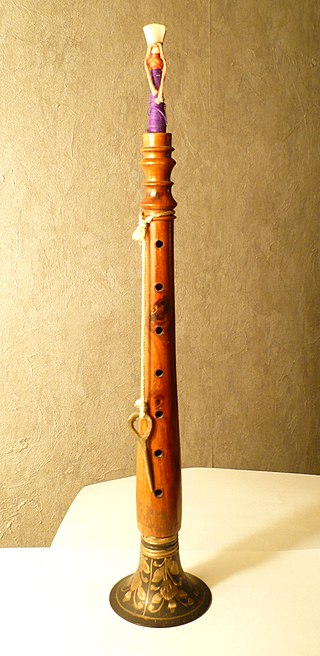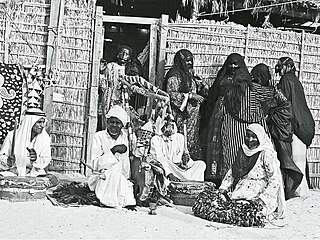Mizmar (Arabic: مزمار) can refer to
Mizmar (Arabic: مزمار) can refer to

The traditional music of Jordan has a long history. Rural zajal songs, with improvised poetry played with a mijwiz, tablah, arghul, oud, rabab, and reed pipe ensemble accompanying is popular. The transition of old cultural music into hit pop songs known worldwide. Recently, Jordan has seen the rise of prominent DJs and pop stars.

The shehnai, is a type of oboe originating from the Indian subcontinent. It is made of wood, with a double reed at one end and a metal or wooden flared bell at the other end. It was one of the nine instruments found in the royal court. The shehnai is similar to South India's nadaswaram.

In Arabic music, a mizmār is any single or double reed wind instrument. In Egypt, the term mizmar usually refers to the conical shawm that is called zurna in Turkey and Armenia.

The zurna is a double reed wind instrument played in Central Asia, West Asia, the Caucasus, Southeast Europe and parts of North Africa. It is also used in Sri Lanka. It is usually accompanied by a davul in Armenian, Anatolian and Assyrian folk music.

Tahtib is the term for a traditional stick-fighting martial art originally named fan a'nazaha wa-tahtib. The original martial version of tahtib later evolved into an Egyptian folk dance with a wooden stick. It is commonly described in English as a "stick dance", "cane dance", "stick-dancing game", or as ritual mock combat accompanied by music. Nowadays, the word tahtib encompasses both martial practice and performance art. It is mainly practiced today in Upper Egypt. Tahtib is regularly performed for tourists in Luxor and Aswan.
The term double clarinet refers to any of several woodwind instruments consisting of two parallel pipes made of cane, bird bone, or metal, played simultaneously, with a single reed for each. Commonly, there are five or six tone holes in each pipe, or holes in only one pipe while the other acts as a drone, and the reeds are either cut from the body of the instrument or created by inserting smaller, slit tubes into the ends of the pipes. The player typically uses circular breathing.

The rhaita or ghaita is a double reed instrument from West North Africa, specifically Morocco, Algeria and Mauritania. It is nearly identical in construction to the Arabic mizmar and the Turkish zurna. The distinctive name owes to a medieval Gothic-Iberian influence. In southern Iberia, various sorts of wind instruments, including the related shawm, are known as gaitas, but in northern Iberia gaita refers only to bagpipes.

Afro-Arabs, African Arabs, or Black Arabs are Arabs who have predominantly or total Sub-Saharan African ancestry. These include primarily minority groups in the United Arab Emirates, Yemen, Saudi Arabia, Oman, Kuwait, Qatar, Bahrain, Lebanon, Syria, Palestine, Jordan, Iraq, Libya, Tunisia, Algeria, and Morocco. The term may also refer to various Arab groups in certain African regions.
The traditional dances of the Middle East span a large variety of folk traditions throughout North Africa, the Middle East, and Central Asia.

Ardah is a type of folkloric group dance in the Arabian Peninsula, in most countries located in the Gulf Cooperation Council. The dance is performed with two rows of men opposite of one another, each of whom may or may not be wielding a sword or cane, and is accompanied by drums and spoken poetry.

"Amulet" is an electronic–world music song performed by Belgian singer Natacha Atlas and Moroccan-French band Sawt el Atlas. The song was written by Natacha Atlas, Count Dubulah, Hamid ManTu and Alex Kasiek and produced by Transglobal Underground for Atlas' second album Halim (1997).
Līwa is a Khaleeji traditional dance of African origin performed in Eastern Arabia, mainly within communities of descendants of people from the Swahili Coast. It is also performed by the African-descended Sheedi community, as well as the Baloch of Makran Coast and Karachi area.
The zukra is a Libyan bagpipe with a double-chanter terminating in two cow horns; it is similar in construction to the Tunisian mizwad.
The Brothers of the Baladi is an American world music band based in Portland, Oregon. They play both traditional Middle Eastern music, and also combines traditional Middle Eastern and western sounds and instruments for a unique Worldbeat sound. Band leader/percussionist/vocalist Michael Beach provides lyrics in Arabic, Turkish, Persian, French, Spanish, Kurdish, Armenian and English, and the band features many traditional Middle Eastern instruments including oud, saz, mizmar, midjwiz, arghool, doumbek, riq, def, tar, bendir and davul.

Arabic musical instruments can be broadly classified into three categories: string instruments (chordophones), wind instruments (aerophones), and percussion instruments. They evolved from ancient civilizations in the region.
YouTube Premium is a subscription service offered by the American video platform YouTube. The service provides ad-free access to content across the service, as well as access to premium YouTube Originals programming produced in collaboration with the site's creators, downloading videos and background playback of videos on mobile devices, and access to the music streaming service, YouTube Music, along with other benefits. It has over 100 million subscribers.

If I Was: The Very Best of Midge Ure & Ultravox is a 1993 compilation album by Scottish musician Midge Ure, featuring songs from his solo career and as part of the new wave and synthpop band Ultravox, along with Ure's collaborations with Mick Karn, Phil Lynott, Visage, and charity supergroup Band Aid.

Mezmar or mizmar is a traditional group performance and stick song-dance that is performed by in the Hejaz region in western Saudi Arabia for festive occasions such as wedding and national events. Almezmar is performed by about 15–100 practitioners in festive occasions such as wedding and national events, they twirl long sticks, beat drums and clap to songs that can pertain to a variety of topics such as heroism, praise, chivalry, love and generosity. In the past, the ritual was associated with battle or competition. It closely resembles the tahtib dance practiced in Egypt and Sudan.

Muhieddine Abdul Razzak Itani, also known as Tabello, was a Lebanese footballer who played as a full-back.